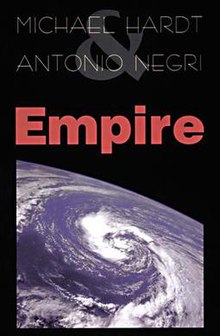Empire (Negri and Hardt book)

Cover of the first edition
|
|
| Author | Michael Hardt and Antonio Negri |
|---|---|
| Country | United States |
| Language | English |
| Subject | Globalization, international relations |
| Published | 2000 (Harvard University Press) |
| Media type | |
| ISBN | (hardcover) (paperback) |
| OCLC | 41967081 |
| 325/.32/09045 21 | |
| LC Class | JC359 .H279 2000 |
| Preceded by | Labor of Dionysus: A Critique of the State-Form |
| Followed by | Multitude: War and Democracy in the Age of Empire |
Empire is a book by post-Marxist philosophers Michael Hardt and Antonio Negri. Written in the mid-1990s, it was published in 2000 and quickly sold beyond its expectations as an academic work.
In general, the book theorizes an ongoing transition from a "modern" phenomenon of imperialism, centered on individual nation-states, to an emergent postmodern construct created among ruling powers which the authors call "Empire" (the capital letter is distinguishing), with different forms of warfare:
...according to Hardt and Negri's Empire, the rise of Empire is the end of national conflict, the "enemy" now, whoever he is, can no longer be ideological or national. The enemy now must be understood as a kind of criminal, as someone who represents a threat not to a political system or a nation but to the law. This is the enemy as a terrorist....In the "new order that envelops the entire space of... civilization", where conflict between nations has been made irrelevant, the "enemy" is simultaneously "banalized" (reduced to an object of routine police repression) and absolutized (as the Enemy, an absolute threat to the ethical order").
Empire elaborates a variety of ideas surrounding constitutions, global war, and class. Hence, the Empire is constituted by a monarchy (the United States and the G8, and international organizations such as NATO, the International Monetary Fund or the World Trade Organization), an oligarchy (the multinational corporations and other nation-states) and a democracy (the various non-government organizations and the United Nations). Part of the book's analysis deals with "imagin[ing] resistance", but "the point of Empire is that it, too, is "total" and that resistance to it can only take the form of negation - "the will to be against". The Empire is total, but economic inequality persists, and as all identities are wiped out and replaced with a universal one, the identity of the poor persists.
...
Wikipedia
